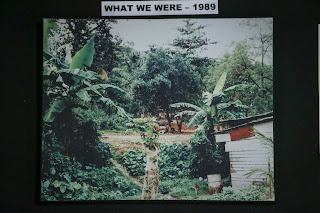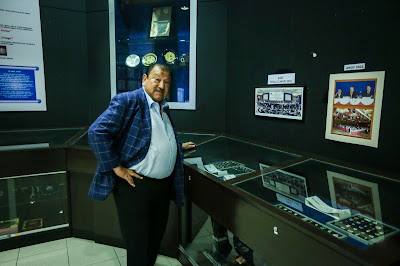ICON: Tunku Tan Sri Imran Tuanku Ja’afar
By Tony Mariadass
Pictures by: Mohd Firdaus Abdul Latif
Tunku Tan Sri Imran Tuanku
Ja’afar believes in being first in whatever he does and has carved a niche at
it.
And it is little surprise
for Tunku Imran born on 21st March 1948 is and Aries, the first sign of the zodiac, and that's pretty much how
those born under this sign see themselves: first.
Aries are the leaders of the pack,
first in line to get things going – an initiator.
Born in 1948, it is the Year of the
Rat, the first in the Chinese zodiac cycle of 12 zodiac animals.
He is known to be with strong intuition
and quick response, always easily adapt himself to a new environment. With rich
imaginations and sharp observation, Rats can take advantage of various
opportunities well. Rats have strong curiosity, so they tend to try their hands
at anything, and they can deal with it skilfully.
March 21 is also the first day of spring in the Northern Hemisphere — also known as the vernal equinox.
“My birthdate and year basically sums
me up and I have always lived up to it. Whatever I do, I am an innovator and
want to emerge tops,” said the 67-year-old second son of Tuanku Jaafar Tuanku
Abdul Rahman, the tenth Yang di-Pertuan Agong of Malaysia and the fourth Yang
di-Pertuan Besar of Negeri Sembilan. Malaysia’s first King Tuanku Abdul
Rahman was Tunku Imran’s grandfather.
Indeed, Tunku Imran has a long
history with sports in Malaysia which dates back from the 70s till now.
He is currently the president of the
Olympic Council of Malaysia (OCM) – a
position he has been at the helm for 17 years – and was elected for another two
years in the recent elections which he said will be his last term.
He may be of royal blood, but it is
the sports blood which has seen him give so much for Malaysian sports and taken
it to great frontiers.
“My sports background stems from the
fact that I was in a boarding school in King’s School in Canterbury from 1956
to 1966 and later at Nottingham University (1967-70) before finishing off at
Gray’s Inn (an honours Law graduate in 1970 before being called to the Bar at
Gray’s in 1971),” said Tunku Imran.
“I was involved in virtually all
sports – rugby, hockey, cricket, squash, tennis, badminton and athletics –
during my time in England.
“But during my later years, I was
more actively involved in squash and cricket.”
While playing cricket he saw his
schoolmate David Gowers go onto captain England in Test matches.
Tunku Imran having been England for
such a long time is also known to his close
friends as Pete.
When Tunku Imran returned
to Malaysia in 1971, he became a successful entrepreneur and but sports was still
very much part of his life.
He represented Malaysia on
a cricket tour in 1971 and was the captain of the Selangor Club cricket team.
In 1974 he formed the
Federal Territory Cricket Association and was the Malaysian Cricket Association
president in 1991 to 2011 and patron from 2011.
Tunku Imran best remembers
batting with the great Gary Sobers in 1984 during the Selangor Club centennial
celebration match.
Sir Garfield (Gary) Sobers,
the great West Indian cricket all-rounder, was and remains Tunku Imran’s role
model.
“He’s such a great human
being. Despite his outstanding talent, he is such a humble and humane person.”
In parallel, he formed the
Squash Racket Association of Malaysia (SRAM) in 1972 and was the first
secretary of the association.
Tunku Imran was the first
national squash champion in 1973.
“Many people said that I
formed SRAM to organise the national championship and win it. The truth of the
matter was I was seeded fifth and worked hard for my victory,” said Tunku Imran
with his hearty laugh.
Tunku Imran was SRAM
president from 1978 to 1989 before he became the World Squash Federation
president (1989-1996) and Emeritus President of the world body from 1996-2002
and patron from 2002.
It was during his tenure as
the world body president that squash made the first bid to be included in the
Olympics for the Los Angeles Olympics in 1994, but was told that the ‘bus was
full’.
Tunku Imran an advocator of
development and innovation was also responsible for the rise of squash in the
country, with the first junior development programme in the 80s when Chris
Clarke was hired to head the programme.
Through the programme saw
Malaysia produce the first junior world champion in 1996 when Ong Beng Hee won,
followed Nicol David.
Tunku Imran is indeed a man
of firsts for he was the one who presented the paper on the Malaysia Games
(SUKMA) – a youth Games – which became a reality and was the chairman of the
first Games in 1986.
Similarly, he is the founder
chairman of the Foundation for Malaysian Sporting Excellence (SportExcel) (from
1991) – a Foundation for supporting elite junior athletes – which has produced
many champions in various sports.
Tunku Imran’s first are
many which include playing a key role in team which secured the 1998
Commonwealth Games to be held in Kuala Lumpur and was the director of Sukom 98’
Bhd Bhd (Organising Committee of the XVI Commonwealth Games 1998).
At the Games saw the
introduction of team sports to change the face of the Games with the inclusion
of cricket, rugby, netball and tenpin bowling.
Tunku Imran was
instrumental in the building of the Wisma OCM from the first phase in 1990.
Tunku Imran was also the
first Asian president of the Commonwealth Games Federation who addressed the
Commonwealth Games participants at the Glasgow Games last year – a indeed a
rare honour.
“I wished I had another
four years with CGF, but I think I had done my bit in the four years I was with
them with several changes to the administration and vision,” said Tunku Imran
who speaks English, Malay, French and German.
Among the other first is
Tunku Imran realising his vision to have a sports channel for Malaysia.
“I wanted to do it myself
as a business but did not have the means. But I am glad that I managed to
convince Astro to take
up challenge and make it a reality with Astro Arena,” said Tunku Imran with an air of satisfaction.
Other firsts include OCM
under his leadership organising the Association of National Olympic Committees (ANOC) in 2002 and
the International Olympic Council (IOC) Executive Board Meeting and
128th IOC Session in Kuala Lumpur recently.
Tunku Imran a National
Sports Council of Malaysia board member since from 1985 has held
international positions which include Executive
Board Member of International Cricket Council (1997-1999 and 2001-2008);
Chairman of Associate Members of the International Cricket Council (2001-2008);
Vice President: Asian Cricket Council (1993-2004); Vice President: Commonwealth
Games Federation (2000-2011); President Southeast Asian Games Federation
(2000-2001); Honorary Life President: Southeast Asian Games Federation (from
2001) ; member of Advisory Board of Olympic Council of Asia;
member (Representative of
ANOC) of The International Council of Arbitration for Sport (ICAS) –
(2002-2014); Executive Council member of Association of National Olympic
Committees (ANOC) (from 2011) ; member of International Olympic Committee (from
2006); member of International Olympic Committee Sport & Law Commission
(2002-2014) and member of International Olympic Committee Sport for All
Commission (from 2006).
At the local scene he had
also helmed Taekwondo Malaysia (WTF) (2010-2014) and is patron from 2014.
As Malaysia is hosting the
2017 Sea Games, Tunku Imran will now assume the presidency of the Sea Games
Federation.
He has also received
numerous sports awards which include an International Honorary Doctorate in
March 2009 from the United States Sports Academy (USSA) for outstanding
leadership and achievement in sports and sports-related professions, selected as the Global winner of the Lifetime Service
Award in June 2009, for the Pepsi ICC Development Program Annual Awards 2008 in
recognition of contribution to the growth of cricket.
He has also been conferred
the Honorary Doctor of Laws in July 2011, by Alma Mater, the University of
Nottingham, received the Honorary Degree of Doctor of the University from the
University of Glasgow in June and received
“Lifetime Achievement Award” from the Alumni of University of Nottingham.
Tunku Imran having done such still has visions before
he leaves OCM.
“I
hope to see better finance management, administration in OCM, set up Council of Arbitration for Sport in Malaysia in
collaboration with Kuala Lumpur regional, make National Sports Associations act
more professionally and give emphasis to development for the future of sports
and keep sports purely sports and free from politics,” said Tunku Imran.
“I am
advocate of sports managers and not administrations. Sports officials have to
think like managers.
“Just look
at all our sports facilities which was under-used or not being used because of
exorbitant charges. We need to innovate and get the facilities to be used at
all times and by various sports. The managers have to think out of the box to
attract people to the facilities. Only then we can have sports culture among
our rakyat.”
Indeed
Tunku Imran is a legacy to sports and even when he retires from OCM in two
years, he is most likely to be involved in sports in many other areas –
especially in development which is his passion.
Thank you
Prince of Sports!









No comments:
Post a Comment